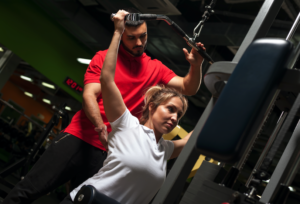 If you look around in any gym you will see a great bunch of well-meaning motivated people working out to get in shape. The problem is that many of them are simply doing it all wrong.
If you look around in any gym you will see a great bunch of well-meaning motivated people working out to get in shape. The problem is that many of them are simply doing it all wrong.
What do I mean?
They, by the standards of proper body mechanics, have very bad. Bad form not only will not produce the results you are looking for, it also can very easily lead to injury. It can also cause additional wear and tear on other body parts.
When starting any exercise program it is a good idea to first visit your chiropractor. Allow them to get you in proper alignment. They can make sure you have no limitations that should be looked out for. This is very much along the lines of the same train of thought that says you should go get an alignment on your car before taking a long road trip so you don’t wear your tires or other mechanical parts unevenly.)
Additional to spinal alignment we can also get you set up on a nutritional plan to make sure you get the maximum results from your workouts.
Many gyms do offer an introductory personal training session. It is a good idea to take this one session at the very minimum. You can talk with them about your goals and ask questions about machines and weight-bearing exercise. If it is in your budget, schedule a few more sessions until you feel you have the hang of it.
Once you feel the way to do an exercise properly you will realize the difference from an incorrect movement. The right way will allow you to focus on the muscle or muscle group being worked. When done incorrectly you are overcompensating with other body parts to complete the movement.
A great thought to go by is – when in doubt? Ask. It will save you time, frustration, wasted effort and even possibly save you from an injury.
If you are in the Southwest Florida area we invite you to visit the offices of Dr. Jason Kaster, D.C. before starting your exercise program. 239-332-2555. www.drkasters.com.
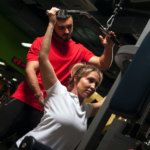

 Chiropractic care is a safe, alternative treatment when applied appropriately. Chiropractic treatments help in dealing with the symptoms of many conditions. Are you going to wait for your symptoms to be felt, or are you going to prevent it as soon as possible?
Chiropractic care is a safe, alternative treatment when applied appropriately. Chiropractic treatments help in dealing with the symptoms of many conditions. Are you going to wait for your symptoms to be felt, or are you going to prevent it as soon as possible?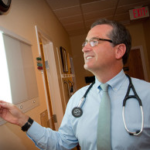
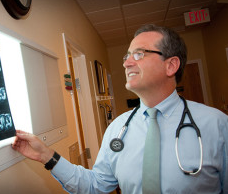 Gallbladder pain is unmistakable if you have ever experienced it. It can range from a dull ache to a sharper debilitating doubling over kind of pain that seems to go straight through your core.
Gallbladder pain is unmistakable if you have ever experienced it. It can range from a dull ache to a sharper debilitating doubling over kind of pain that seems to go straight through your core.
 When you try and lay down at night to fall asleep do your legs start moving and twitching involuntarily? This is what is known as Restless Leg Syndrome. It can range from uncomfortable to incredibly annoying, even painful and lead to insomnia, which in turn can bring about other lack of sleep related health problems.
When you try and lay down at night to fall asleep do your legs start moving and twitching involuntarily? This is what is known as Restless Leg Syndrome. It can range from uncomfortable to incredibly annoying, even painful and lead to insomnia, which in turn can bring about other lack of sleep related health problems.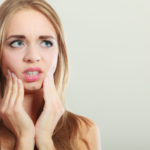
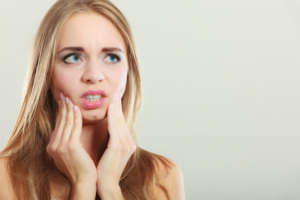 TMJ can be caused by your genetics, trauma to the jaw or even arthritis. Nocturnal tooth grinding and clenching can also play a role, though tooth grinders don’t always develop TMJ.
TMJ can be caused by your genetics, trauma to the jaw or even arthritis. Nocturnal tooth grinding and clenching can also play a role, though tooth grinders don’t always develop TMJ.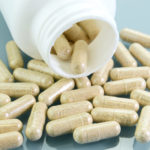
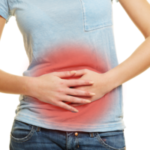
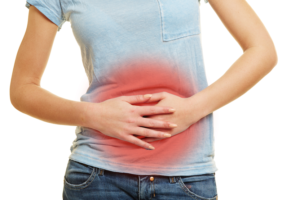 Irritable bowel syndrome – and the uncomfortable abdominal pain, gas and chronic diarrhea or constipation that goes with it – can be a mild inconvenience or a severe impediment to daily life, affecting an individual’s social and professional habits. Two out of every three people with IBS symptoms are female, according to the International Foundation for Functional Gastrointestinal Disorders.
Irritable bowel syndrome – and the uncomfortable abdominal pain, gas and chronic diarrhea or constipation that goes with it – can be a mild inconvenience or a severe impediment to daily life, affecting an individual’s social and professional habits. Two out of every three people with IBS symptoms are female, according to the International Foundation for Functional Gastrointestinal Disorders.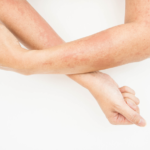
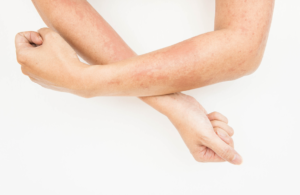 Breaking out in hives can make you crazy. The itching, the scratching, it can be so intense it keeps you up at night. Nothing seems to help and until you know the source, you feel doomed to bouts at pretty well any moment.
Breaking out in hives can make you crazy. The itching, the scratching, it can be so intense it keeps you up at night. Nothing seems to help and until you know the source, you feel doomed to bouts at pretty well any moment.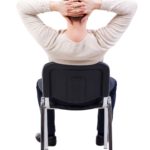
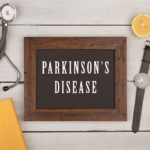
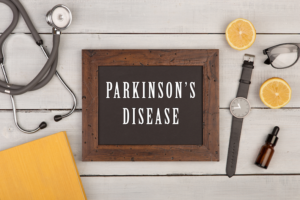 Loss of Smell – Have you noticed that your ability to sense through smell has been diminishing? Try licorice, bananas, and pickles. If you cannot smell them that may be a cue.
Loss of Smell – Have you noticed that your ability to sense through smell has been diminishing? Try licorice, bananas, and pickles. If you cannot smell them that may be a cue.